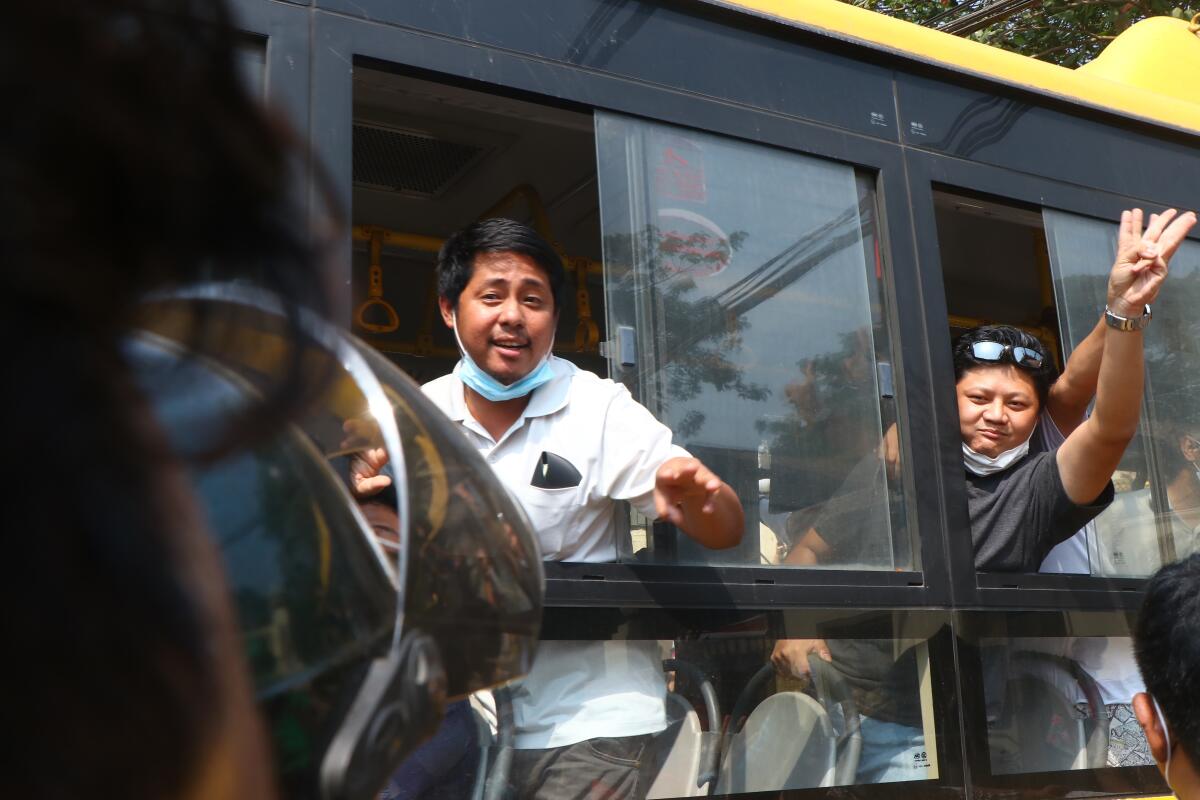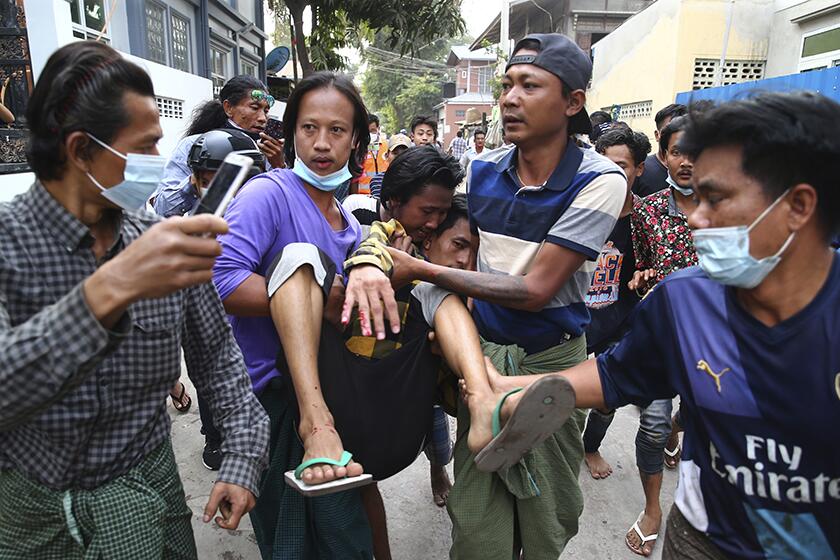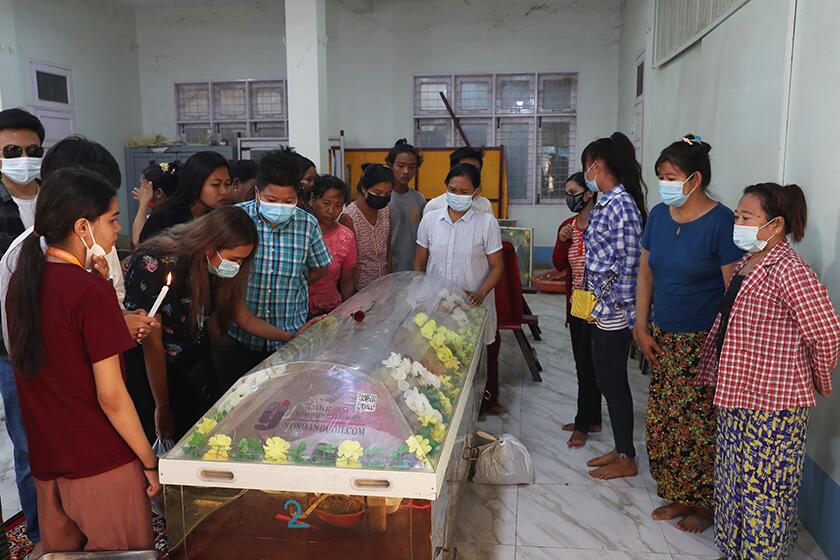Idle businesses, uncollected taxes. How Myanmar is tumbling toward a ‘failed state’

- Share via
YANGON, Myanmar — The roads were clear of cars, restaurants sat empty behind metal gates, and convenience stores, the nerve center of so many neighborhoods, remained silent and dark.
It was a scene repeated across Myanmar on Wednesday as anti-coup protesters called for a “silent strike” to increase pressure on the military government, which seized power last month and, since, has killed more than 420 civilians, including at least 114 Saturday in a spasm of violence that also left several children dead.
The strike, part of a widespread civil disobedience movement that includes rail workers, bank employees, doctors, factory laborers and even diplomats, is designed to cripple Myanmar’s economy in hopes of fracturing the junta and denying it legitimacy.
Taxes are being left uncollected. Many banks are unable to send and receive funds. Trade has been paralyzed by a lack of customs agents and striking truck drivers. The country of 54 million is spiraling closer to a “failed state” or “civil war,” analysts for Eurasia Group said.
Whether Myanmar collapses could depend on the staying power of the civil disobedience movement, which has been condemned by a flustered military that has responded by arresting and targeting those involved. Earlier this week, striking railway employees and their families were evicted from state housing.
The walkouts and economic disruption are born of desperation. But the campaign is a risky gambit in one of the poorest and most underdeveloped countries in Asia, a nation that was already reeling from the COVID-19 pandemic. Push too hard, and the movement not only punishes the junta but also civilians struggling to survive.
The United Nations World Food Program warned this month that rising food prices triggered by the crisis might increase hunger among the millions who live meal-to-meal. Migrant workers are reportedly fleeing factory districts in Yangon, Myanmar’s largest city, in droves because they can no longer find work and are being terrorized by security forces.
The World Bank said Friday that Myanmar’s economy was set to contract 10% this year, a reversal from its last forecast, in October, of 5.9% growth.
Opponents of the military dictatorship, including remnants of the deposed civilian government, see choking the economy as their best weapon. It is highly unlikely the U.N. will intervene with force despite rising international condemnation over the junta’s brutality.
Sanctions have proved ineffective in the past. Powerful neighbors such as China and India are more concerned with their regional influence than restoring democracy in Myanmar. And the military, known as the Tatmadaw, has shown no significant signs of rifts within its ranks that could reverse its power grab.
“It’s better to die than live under a military regime,” said a foreign ministry official supportive of the civil disobedience movement who spoke on the condition of anonymity to protect his family. “We have nothing to lose. We’ve already lost everything. We have no education system, no healthcare, no economic equality. What future is there?”
That’s not how things looked a decade ago when democratic reforms ended nearly 50 years of military dictatorship in a country ravaged by civil war, ethnic strife and the painful legacy of British colonialism.
More than 2,000 people have been arrested, many in their homes, in a bid to quash resistance to the junta. Two Myanmar officials have died in custody.
Foreign brands like Coca-Cola and KFC poured into Myanmar, which is also called Burma, viewing it as one of the last frontier markets left to tap in Asia. The garment industry sparked a boom in exports. With access to the internet, a generation was being raised free from isolation.
Progress was slow. Armed conflict still marred swaths of the country. Infrastructure such as roads and electricity remain woefully inadequate. The civilian government led by Aung San Suu Kyi, who has been under house arrest since the Feb. 1 coup, often prized loyalty over expertise. And the Tatmadaw’s leadership carved out business empires to enrich their families and cronies, partnering with foreign companies such as Chevron and Hilton.
Yet hope persisted. The country’s economy grew apace, providing migrants such as Soe Soe New a way out of poverty.
The 26-year-old left her war-torn state of Rakhine in western Myanmar five years ago and found steady income as a garment worker in Yangon, earning more than $200 a month, enough to support her parents back home.
The pandemic put an end to her good fortune. As foreign brands canceled orders, jobs began to disappear. Her monthly income dwindled to $85. Things have only gotten worse since the coup. She’s now trying to make $34 last until she can find a new job.
“I’m upset because I came here to work for my survival, and now there isn’t any work,” Soe Soe New said. “Most of my friends have had to go back to their villages. I may also have to go back home if the situation continues getting worse.”
Soe Soe New said she’d had little time to reflect on the civil disobedience movement, which is known more commonly as CDM.
“I have to consider myself first,” she said. “If we don’t work, we don’t get money. I need to support my parents.”
Kyaw Nyant, a 67-year-old street vendor in Yangon who belongs to a generation of migrants from the Irrawaddy delta who fled the devastation of Cyclone Nargis in 2008, sympathizes with the anti-coup protesters defying the junta’s violent crackdown. But the fruit and vegetable seller declined to share his views on the CDM.
“When I was young,” he said, “I saw many people who were killed just for talking politics.”
His concern is securing enough food and medicine. He earns only $3 a day, about half of what he needs to make ends meet. Gone are the donations of rice and cooking oil from the former civilian government. He’s had to rely on help from his children and older brothers to get by, though he’s unsure how long that can last.
Kyal Sin wore a T-shirt that said ‘Everything will be OK’ when she was shot by Myanmar security forces on the deadliest day since the military coup.
“I don’t feel much of anything for the political movement because I have faced many difficult situations,” said Kyaw Nyant. “The young people are protesting against the military regime to change their future and their destiny. They believe they are doing it to build a better society.”
If that fails, Myanmar could face a crisis that resembles Syria’s implosion, said a nongovernmental expert on conflict management speaking privately to avoid jeopardizing his staff in Myanmar.
“The worst case scenario would be a civil war,” he said. “We could see the establishment of a parallel government that holds territory so that humanitarian relief assistance reaches some parts of the country but not others.”
Such collapse does not appear imminent. Myanmar’s thriving underground economy fueled by smugglers and traders along the border regions could allow the country to muddle through, he said.
Others say the Tatmadaw will likely try to circumvent the damage to the economy by exploiting the country’s abundant natural resources such as oil and gas, timber and jade. The military government already hastily organized a gems auction for next month to raise badly needed revenue.
“If we look at how the Tatmadaw ruled the country, it was by pillaging resources for funding,” said Kevin Woods, an environmental expert on Southeast Asia at the University of Hawaii.
Foreign companies and organizations that gambled on Myanmar’s resurgence over the past decade are now torn on whether to recognize the junta by paying taxes. Growing scenes of civilians being gunned down, tortured and beaten have made remaining in the country increasingly untenable.
Global Guardian, a McLean, Va.-based security services company with several major foreign corporate clients in Myanmar, has been organizing evacuations, first on commercial flights and, now, charter flights.
Those journeys have been sporadic, delayed at times because there haven’t been enough air traffic controllers or staff working at airport X-ray scanners, said Dale Buckner, the firm’s chief executive.
One of Global Guardian’s most coveted services amid the disruption to banking involves sending money through a broker in Singapore who has cash on hand in Myanmar so that employees can be paid.
The deterioration of the economy and the rise in violence in the past two weeks prompted Buckner to warn his clients the crisis wouldn’t resolve itself anytime soon.
“The panic is starting to truly set in,” he said.
Times staff writer Pierson reported from Singapore and special correspondent Kyaw Hsan Hlaing from Yangon. Special correspondent Andrew Nachemson in Yangon contributed to this report.
More to Read
Sign up for Essential California
The most important California stories and recommendations in your inbox every morning.
You may occasionally receive promotional content from the Los Angeles Times.
















